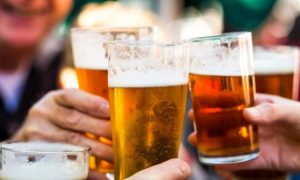It is no secret that obesity rates in the United States continue to rise.
The causes of obesity are complex and multi-faceted, but they can broadly be divided into two categories: lifestyle choices and genetic factors.
But what if you could eat more food and not experience weight gain?
While it may seem counterintuitive, eating more of the right food can help you accomplish your weight loss goals.
Read More : Donald Trump’s Financial Jeopardy Grows
Science-Backed Ways To Lose Weight
According to the latest statistics, over 40% of adults and nearly 20% of children are obese.
Though many fad diets and quick-fix solutions are available, lasting weight loss requires changes to your diet and lifestyle.
The essential factor for weight loss is creating a calorie deficit, which means consuming fewer calories than you burn. One of the most effective ways of creating a calorie deficit is to eat more nutrient-dense foods.
Nutrient-dense foods contain a large number of nutrients relative to their calorie content. Most importantly, they are high in fiber and water.
In other words, the more of these foods you add to your diet, the easier it will be to stay full, create a calorie deficit and achieve your weight loss goals.
Here is a list of 9 powerful nutrient-dense foods that can help you lose weight.
Plain Greek-Yogurt
A cup of plain Greek yogurt has around 20 grams of protein and only 130 calories. The high protein content helps keep you full, while the lack of sugar minimizes caloric density.
Cultured yogurt has other benefits, such as being a good source of calcium and helping to improve gut health and digestion due to the probiotics present in the yogurt.
Chia Seeds
Chia seeds are tiny black seeds that come from a plant in the mint family. These small seeds contain nutrients, including fiber, protein, calcium, and omega-3 fatty acids.
Just one ounce of chia seeds contains 11 grams of fiber and four grams of protein, making them incredibly filling food. You can add them to your yogurt, oatmeal, or smoothies.
Read More : What Is Fintech? Here Are 5 Examples and Their Benefits
Watermelon
Watermelon is a refreshing and hydrating fruit that’s also low in calories. One cup of watermelon contains only 45 calories and is a good source of vitamins A and C.
This tasty fruit is also over 90% water, which helps to keep you hydrated and satiated by occupying space in your stomach.
Strawberries
Berries are a great option to help you satisfy your sweet tooth due to their natural sugar content while still being a nutrient-rich food. Berries make a great snack that you can add to yogurt, oatmeal, and smoothies.
Also, the high water content in berries helps to keep you hydrated and satiated. One cup of strawberries contains only 50 calories and is a good fiber and vitamin C source.
Subbing strawberries for your dessert is a great way to satisfy your sweet tooth without packing on the pounds.
Grapefruit
Grapefruits are tart citrus fruits that have a long history of use in cooking.
Grapefruits and other citrus fruits are full of nutrients and beneficial plant compounds that help fight inflammation and may help to lower blood pressure.
There are 70 calories in one grapefruit.
Read More : Joe Biden Calls Out Supreme Court to Their Faces
Mushrooms
Mushrooms are another staple food that can increase satiety while dieting. They are low in calories but high in water and fiber, which helps to keep you full.
One cup of mushrooms contains only 22 calories but provides three grams of protein and four grams of fiber.
Spinach
Leafy green vegetables are the best food to include in your diet when trying to lose weight. They are very low in calories but high in nutrients.
One cup of spinach contains only seven calories. Still, it is a good source of vitamins A, C, and K, as well as magnesium and iron. Spinach can be eaten raw or cooked and goes well in salads, smoothies, and soups.
Peas
Peas are a vegetable often overlooked in healthy eating but can be very helpful when trying to lose weight.
One cup of peas contains around 120 calories and eight grams of protein. Try consuming them as a side dish or adding them to soups and stews.
Peas are also a good source of fiber, vitamins C and K, manganese, and folate.
I love adding peas to fettuccine and pastas.
Cauliflower Rice
Cauliflower is a low-carbohydrate vegetable that is high in fiber and nutrients. One cup of cauliflower contains only 20 calories.
This veggie is also a good source of vitamins C, K, and B complex vitamins. The great thing about cauliflower is that it is voluminous and goes well with many different flavors.
Cauliflower is incredibly versatile. It’s great roasted or raw, and you can also swap riced cauliflower out for any recipe that calls for regular rice (like this Surf n’ Turf Paella Recipe). You can also Make Cauliflower Pizza Crust or Pie Crust (Paleo and Gluten Free).
Read More : Joe Biden Calls Out Supreme Court to Their Faces
How to Exercise For Weight Loss
Exercise is another helpful tool for losing weight, though it is not as important as diet. Increasing your physical activity can help improve your metabolism and increase the number of calories you burn regularly.
Exercise options include:
- Aerobic exercise, such as walking, cycling, running, or swimming
- Weight training for increasing muscle mass and strength
- Calisthenics for improving relative strength
Of the three, aerobic exercise is the most effective for weight loss due to the duration of the activity.
However, resistance training can help you maintain muscle mass while you lose fat.
Either way, the key is finding an activity you enjoy and can stick with long-term. Creating a workout routine that you look forward to will make you more likely to stick with it and achieve successful weight loss.
Read More : Joe Biden Calls Out Supreme Court to Their Faces
Conclusion
The bottom line is that it is challenging to overeat nutrient-dense foods. These foods are low in calories and have high water, protein, or fiber content, all of which help to increase satiety.
In other words, eating regular portions of these foods will help you to feel full and satisfied while providing your body with numerous health benefits.
So if you are looking for healthy weight loss, consider adding some of these nutrient-dense foods to your daily diet.



































